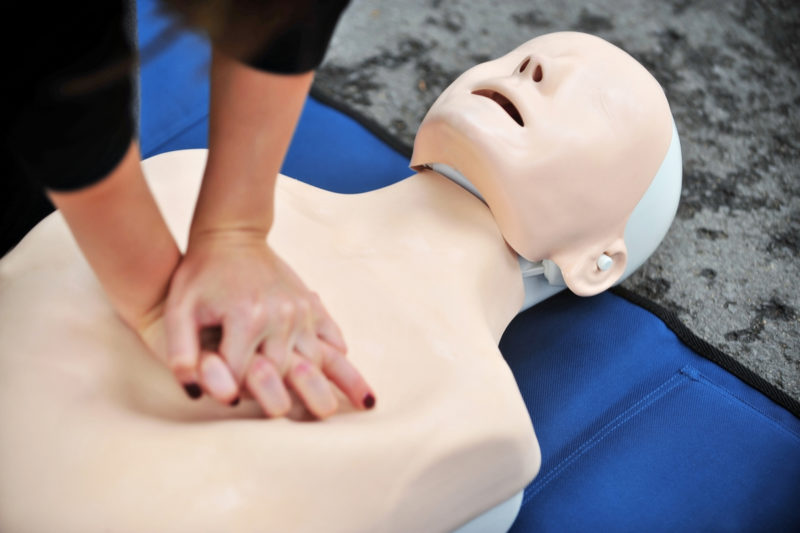This Week in Sex: Even Great Sex Will Likely Not Stop Your Heart
Heart-stopping sex might be rarer than we think. IUDs might lower your risk for cervical cancer. And a vibrator “accidentally” recorded a couple’s sex toy session.

This Week in Sex is a summary of news and research related to sexual behavior, sexuality education, contraception, STIs, and more.
High-profile men dying while in bed with their mistresses is a common plot point in police procedurals but is unlikely to happen to anyone in real life, says a new study presented at the American Heart Association’s Scientific Sessions 2017. Researchers at Cedars-Sinai Heart Institute in Los Angeles looked specifically at sudden cardiac arrest, which happens when there is a disturbance in the heart’s rhythms that causes the heart to stop pumping blood.
Though victims of sudden cardiac arrest often have pre-existing heart conditions, this event tends to happen without any warning or advance symptoms. The heart stops beating, the person loses consciousness within seconds, and they often die within minutes unless treated. Less than 10 percent of people survive cardiac arrest.
This is different from a heart attack, which is a circulation problem. During a heart attack, a part of the heart stops getting enough blood—usually from a blockage—but the heart itself never stops beating. Heart attacks usually come with symptoms that can help a person recognize they are in trouble and spurs them to seek treatment.
It can be hard to do research on sudden cardiac events because they are not common (if you follow 10,000 people for a year, maybe five or six will have one) and because death certificates are not always specific enough in describing what happened (which makes retrospective studies harder).
For the study, researchers tracked 4,457 cases of cardiac arrest over 14 years in Portland, Oregon, by looking at death records and then talking to the emergency medical technicians or ambulance personnel who came to treat the victims. The victims ranged from ages 34 to 83, two thirds were men, and pre-existing heart conditions and taking heart medication were common among the group.
Only 34 of these cases, or 0.7 percent, took place during sexual intercourse or within one hour afterwards. Almost all cases (32) were men.
The researchers say this study should be reassuring to heart patients and their partners because it shows that the chances of dying from cardiac arrest during sex are very low, even for those with pre-existing conditions. They also noted that only one-third of those who suffered sudden cardiac arrest during sex were given CPR despite clearly being with someone else.
Maybe it’s time for all of us who have sexual partners, especially those whose partners have a history of heart issues, to get reacquainted with Resusci Annie (the practice dummy from CPR classes).
IUDs May Lower Cervical Cancer But Researchers Still Don’t Know Why
For a new study published in the medical journal Obstetrics & Gynecology, researchers conducted a meta-analysis of 16 studies that included more than 12,000 women around the world and concluded that the rates of cervical cancer were one-third lower in women who had intrauterine devices.
The study didn’t include any clinical research, however, so it can’t explain why IUDs might reduce the chances of cervical cancer. One theory is that the IUD, by virtue of being a foreign object in the body, causes an immune system reaction that can fight HPV, the virus that causes 99 percent of all cervical cancer.
In the United States, about 12,000 women a year are diagnosed with cervical cancer and 4,000 women die from it, but it is very preventable. HPV also causes cancers of the vagina, vulva, penis, anus, head, neck, and throat, but there are now vaccines that can prevent the types of HPV infections most likely to cause these cancers. Moreover, routine Pap tests can catch changes in cervical cells, which can be treated before they become cancerous.
Nonetheless, more research about why IUDs might prevent cervical cancer would be helpful to women, especially those in parts of the world where there is less access to prevention methods.
Vibrator “Accidentally” Recorded Audio
Loud moans from users of the Lovense remote control vibrator might have been recorded for posterity. The company that makes the vibrator admits that a bug in the smartphone app that accompanies the Bluetooth-enabled sex toy accidentally cached recorded audio of a user’s entire experience. The bug was caught by a Reddit user who found a six-minute audio file called “tempSoundPlay.3gp,” and recognized it as the ambient sounds from the last time they used the vibrator and app.
The app allows a partner to control the sex toy from afar during an in-app chat session. To do this, it asks for permission to access the user’s camera and microphone. But it was not supposed to keep a record of the audio. The company confirmed to the user—and to various media outlets—that there was, in fact, a bug in the app that blocked it from deleting the audio right away. The company tried to calm concerns, releasing a statement that said, “But rest assured, no information or data is sent to our servers. The cache file currently remains on your phone instead of deleting itself once your session is finished.” The bug only affected Android phone users and the company claims to have fixed it on November 13th—when the app was updated in the Google Play store.
This is not the first time that app-controlled vibrators have caused some sticky situations (pun completely intended). This year, the manufacturer of We-Vibe settled a class action suit and was ordered to pay $3.75 million for secretly collecting information about users of its Bluetooth-enabled vibrator.
